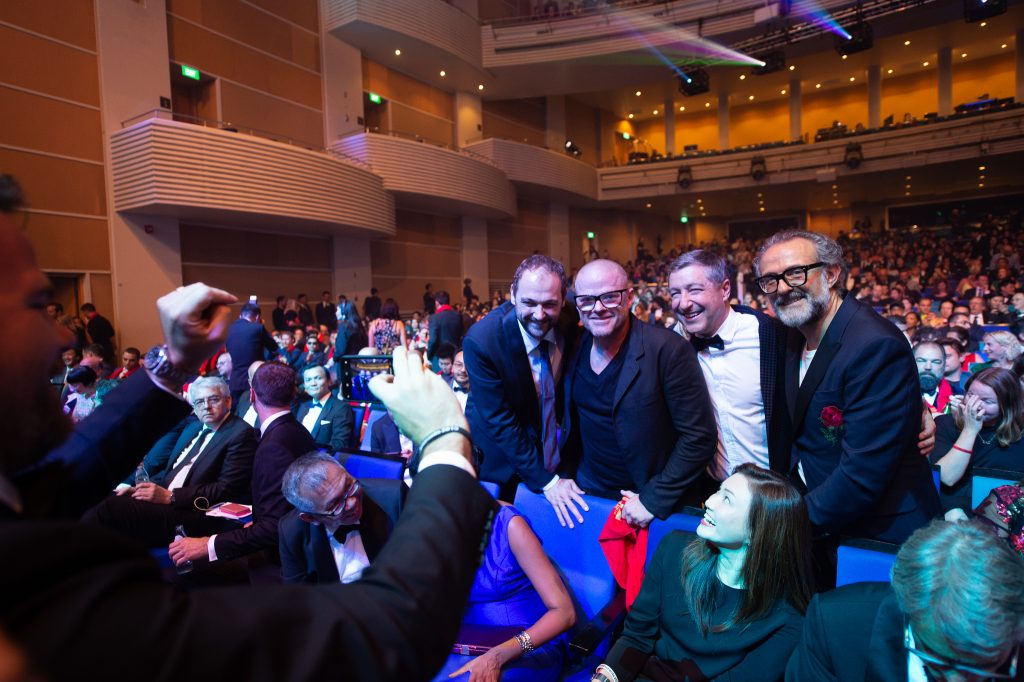
The recent awards ceremony of The World’s 50 Best Restaurants 2019 puts the astronomy in gastronomy as stars of the fine dining scene celebrate the World’s brightest, however, it is not without its contentious moments. This list this year introduces a new award, the Best of the Best, in which winners from past years are inducted into the hall of fame and controversially removed entirely from competing in the 50 Best Restaurants list for now and forever more.

“This year we are thrilled to see Mirazur claim the No.1 spot after rising through the ranks since making its debut on The World’s 50 Best Restaurants list at No.35 in 2009: it’s been brilliant to witness its progress. This has been a wonderful, progressive year for the list as a whole, with so many new entries from all corners of the globe. We are equally delighted to welcome the seven previous No.1 restaurants into the newly created Best of the Best category.” — William Drew, Director of Content of World’s 50 Best Restaurants.
The World’s 50 Best Restaurants 2019
- Mirazur, Menton, France
- Noma, Copenhage, Demark
- Asador Etxebarri, Atxondo, Spain
- Gaggan, Bangkok, Thailand
- Geranium, Copenhagen, Denmark
- Central, Lima, Peru
- Mugaritz, San Sebastian, Spain
- Arpège, Paris, France
- Disfrutar, Barcelona, Spain
- Maido, Lima, Peru
- Den, Tokyo, Japan
- Pujol, Mexico City, Mexico
- White Rabbit, Moscow, Russia
- Azurmendi, Larrabetzu, Spain
- Septime, Paris, France
- Alain Ducasse au Plaza Athénée, Paris, France
- Steirereck, Vienna, Austria
- Odette, Singapore, Singapore
- Twins Garden, Moscow Russia
- Tickets, Barcelona, Spain
- Frantzén, Stockholm, Sweden
- Narisawa, Tokyo, Japan
- Cosme, New York, USA
- Quntonil, Mexico City, Mexico
- Alléno Paris au Pavillion Ledoyen, Paris, France
- Boragó, Santiago, Chile
- The Clove Club, London, UK
- Blue Hill at Stone Barns, Pocantico Hills, USA
- Piazza Duomo, Alba Italy
- Elkano, Getaria, Spain
- Le Calandre, Rubano, Italy
- Nerua, Bilbao, Spain
- Lyle’s, London, UK
- Don Julio, Bueno Aires, Argentina
- Atelier Crenn, San Francisco, USA
- Le Bernadin, New York, USA
- Alinea, Chicago, USA
- Hiša Franko, Kobarid, Slovenia
- A Casa do Porco, São Paolo, Brazil
- Restaurant Tim Raue, Berlin, Germany
- The Chairman, Hong Kong, China
- Belcanto, Lisbon Portugal
- Hof Van Cleve, Kruishoutem, Belgium
- The Test Kitchen, Cape Town, South Africa
- Sühring, Bangkok, Thailand
- De Librije, Zwolle, Netherlands
- Benu, San Francisco, US
- Ultraviolet by Paul Pairet, Shanghai, China
- Leo, Bogotá, Colombia
- Schloss Schauenstein, Fürstenau, Switzerland

And The Winners Are…
In addition to winning Best Restaurant in the World, Mirazur also bagged the Best Restaurant in Europe. Gaggan takes home Best Restaurant in Asia, with Central and Pujol winning Best Restaurant in South America and Best Restaurant in North America respectively. The Test Kitchen in Cape Town takes home the award for Best Restaurant in South Africa.

Den in Tokyo, recognised for their service wins the Art of Hospitality Award (sponsored by Legle France) while Azurmendi takes home the Highest Climber Award (sponsored by Westholme) by jumping 29 places. Italian restaurant Lido 84 takes home the Miele One To Watch Award while Schloss Schauenstein takes home the Sustainable Restaurant Award.

Alain Passard wins the Chefs’ Choice Award (sponsored by Estrella Damm). This award was only voted on by chefs based on their contribution to the culinary industry.

Pre-announced winners include Daniela Soto-Innes, head of Cosme in New York is named Best Female Chef. Jessica Préalpato also takes home Best Pastry Chef (sponsored by Sosa) and Andersen Lee receives the 50 Best BBVA Scholarship.
Humanitarian José Andrés is also honoured with the American Express Icon Award for his contribution towards the less fortunate, with a very compelling speech at the awards recognising all those who help bring about this change.

The Best Of The Best: A Double Edged Sword
This year introduces The Best of The Best, a hall of fame for all restaurants that have achieved the number 1 spot. So what does this mean? Well, what happens is once you’re inducted into this list you are automatically ineligible for competing from here on out. These include El Bulli, The French Laundry, The Fat Duck, the original Noma, El Celler de Can Roca, Eleven Madison Park and 2018 winner Osteria Francescana. This change could be a double-edged sword as it may help or hurt these restaurants in the long run. The advantage of this change is that other restaurants will be able to climb to higher spots without having to compete with the power of fame of the previous winners, shouldn’t being the best mean beating the best?
The disadvantage of this change also play on the fact that previous winners may fall off the radar, although very unlikely. Some argue that it is absurd that all the hard work of chefs over the years cumulates in them winning the award and being removed from the list forever. Will the removal of the previous winners from the list also make these restaurants less attractive to chefs who want to further their careers?
There’s also the fact that new Noma is eligible for competing which is reminiscent of the ship of Theseus, if you take all the old parts, remove them, and place them as new parts, are they essentially the same thing? So should Noma 2.0 be removed from the list altogether too?

The Generally Eurocentric Palate
Another criticism of the process is that most of the restaurants tend to lean towards a Eurocentric palate. Although we are starting to see a further appreciation of South American palates, their connection to Europe is profound in its history. With China’s huge population, how is it that only one restaurant serving Chinese cuisine, The Chairman in Hong Kong, made the list? Is this true representation? We also do not see any contenders from the Indian subcontinent, although its cuisine is appreciated through Gaggan in Thailand. Maybe it’s time for a change and to truly adopt a more global palate.

On Gender Diversity: Best Person For The Job
Another contentious element is the Best Female Chef Award which has been criticised by some as defeating gender diversity. There are arguments from both sides when you take a closer look at culinary culture, you will notice that it has been a male-centric industry for a long time. So, this is where it may become debatable… do you help to equal the playing field by having this award that help promote women in the industry or do you remove the award so that everyone is treated equally? This is a sound move for now, but we can only hope that in a few years this category can be removed completely, once gender bias is removed from the culinary vocabulary.
There’s Always Room At The Table
One of the best things that the World’s 50 Best has done is that it has open doors for many restaurants that would not gain international fame if it wasn’t for the body. With a voting power between exactly 1,040 people including chefs, food writers and gourmands, their ability to reach far and wide should not be underestimated. Despite all the controversy surrounding it, the 50 Best has made more and more efforts in ensuring a balance is met. This year we see a 50/50 voting system when it comes to gender parity, although personally, this too should be based on knowledge rather than gender. The list has in all helped elevate the standard expected of restaurants, and in many ways, have made rock stars out of chefs, and this element can never be denied. So where do we go from here? Well, a little pinch of diversity, with a nice stir of conversation is what is needed to help the culinary industry grow as a whole, as the African proverb says “If you want to go quickly, go alone. If you want to go far, go together.”
For our thoughts on Asia’a 50 Best Bars, see Asia’s 50 Best Bars 2019.
For our thoughts on The World’s 50 Best Bars, see The World’s 50 Best Bars 2019.
For all 50 Best related content, see 50 Best.
| PHOTOGRAPHY: WORLD’S 50 BEST | WEBSITE: WORLD’S 50 BEST RESTAURANTS |